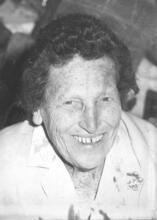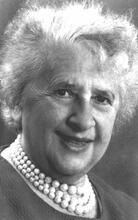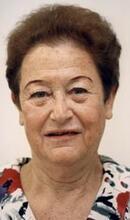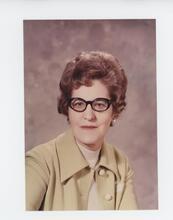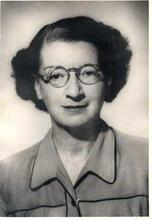Charlotte Auerbach
German scientist Charlotte Auerbach studied biology at university in the early 1920s and became a secondary-school teacher after graduating. However, when the National Socialist government instituted laws prohibiting her from teaching at secular schools, she took her mother’s advice and left Germany, settling at the University of Edinburgh. At the University, Auerbach worked with several notable geneticists, eventually publishing research on the effect of mustard gas on gene mutation, for which she received the Keith Prize of the Royal Society of Edinburgh in 1948. She then became a professor and taught for the next two decades, retiring in 1969. She became renowned for her profound knowledge of classical genetics, especially of mutation. Auerbach spent the remaining years of her life living happily in Edinburgh.
Charlotte Auerbach, “Lotte” to her friends all over the world, was known above all for her discovery in 1941 that gene mutations can be artificially induced by treatment of Drosophila flies with a chemical substance, mustard gas. Later she became renowned for her profound knowledge of classical genetics and especially of mutation. Apart from her scientific eminence, she was remarkable in many ways—for her wide cultural, intellectual and humanitarian interests and her modesty. She had a long and eventful life, part of which was tragically affected by events in Germany during the Nazi period.
Early Life
Auerbach was born in Krefeld am Rhein into a family that had for several generations lived in Breslau (now Wrocłw in Poland). A number of family members were engaged in various aspects of science. Her father, Friedrich (1870–1925), was a chemist who, inter alia, did research on poisons and worked on the nutritional problems that arose in Berlin during and after World War I. His wife, Selma, née Sachs, the daughter of a general practitioner, whom he married in 1897, was very romantic, loved poetry, literature, and music and passed this love and her musical gifts to their only child.
Auerbach grew up and went to school in Berlin, where her father took up a civil service position in 1904. From her walks and talks with him she learned much about nature and about music, his two great loves. Although the one large girls’ school at which she spent all her school years, the Auguste-Victoria-Schule (Realgymnasium) in Berlin-Charlottenburg, taught little biology, a single hour her teacher spent on a subject not included in the curriculum—chromosomes and mitosis— provided “one of the few spiritual experiences of [her] life.”
Education and Early Career
Uncertain what to study, Auerbach followed her father’s advice that she drop into various lectures during her first term at Berlin University in 1919, before deciding on a field of concentration. She soon chose biology, inspired by two of the lecturers whose classes she attended, Karl Heider and Max Hartmann. In 1920–21 she attended university in Würzburg, where she found another inspiring teacher in the well-known botanist, Kneip. In 1921–22 she was back in Berlin studying chemistry and then went to Freiburg for two years. In 1924 she returned to Berlin, passing her state examinations with the grade of “Very Good.” Although her thesis was considered by Heider good enough for publication, she refused to follow his suggestion and in fact decided to train for a career as a secondary-school teacher. Having passed her examinations for secondary-school teachers of science with distinction in November 1924, she taught at a private school in Heidelberg from November 1924 till Easter 1925 and was also briefly employed at the Schiller-Schule in Frankfurt, from which she was subsequently dismissed, apparently because she was Jewish. She later stated that even at that time she suffered greatly from the antisemitism of head teachers and even some of the pupils.
In 1928, having come into a small legacy some years earlier, she started postgraduate research in Developmental Physiology under Otto Mangold at the Kaiser-Wilhelm-Institut für Biologie at Berlin-Dahlem. However, she found working under Mangold, who later became a member of the Nazi party, very unpleasant, because of his dictatorial manner.
Career during Nazi Regime
In 1929, when money from the legacy ran out, Auerbach abandoned her work with Mangold and spent the next few years teaching biology in several girls’ secondary schools in Berlin. In April 1933 the laws promulgated by the National Socialist government put an end to her school teaching, since her mother dissuaded her from applying for a post in a Jewish school. Instead, again following her mother’s advice, she decided to leave Germany. Through the good offices of a friend of her father’s, Herbert Freundlich, who was then working at University College, London, and who put her in touch with George Barger, Professor of Chemistry in relation to Medicine, and Professor F.A.E. Crew, head of the Institute of Animal Genetics, both at the University of Edinburgh, Auerbach made her way to Edinburgh, where she spent the rest of her life.
In Edinburgh she not only received her Ph.D. degree, but stayed on to work under Crew at the Institute, carrying out a number of research projects, the results of which were published in a series of papers under the authorship of Crew and Auerbach, although all the work had been done by Lotte herself. At the Seventh International Congress of Genetics, held at the Institute with Crew as President in the week before the outbreak of World War II, Lotte delivered a short paper describing her work on the effect of some carcinogens on Drosophila.
In 1939 Auerbach obtained naturalization papers, thus fortunately avoiding internment as an enemy alien when war broke out. Her mother succeeded in reaching Edinburgh two weeks before the outbreak of war and the two women lived in cramped quarters, sharing facilities with other refugee families. From a scientific point of view, what was really important was the presence at the Institute, from 1938 till 1940, of H.J. Muller, probably the most eminent geneticist in the world at the time, who had left the USSR with the rise to power of T.D. Lysenko. At Muller’s suggestion, Auerbach started to study the mutagenic action of carcinogens. However, this work was unsuccessful. Better—and striking— results were obtained in research on the effect of mustard gas on gene mutation, which Lotte and others, particularly J.M. Robson, began in November 1940 and which she described in a triumphant letter written on June 7, 1941, to Muller, who was now in the U.S.
Later Career
The work, at first confidential due to the war, was eventually published in 1946 and 1947. Finally, at the Eighth International Congress of Genetics in Stockholm in 1948, Auerbach delivered a comprehensive review entitled “Chemical Induction of Mutations.” At that meeting, Muller, who was then the president, referred to “the dramatic opening up by Auerbach and Robson of the great field of chemical mutagenesis”—a comment which gave Auerbach enormous satisfaction. Indeed, Auerbach received great credit for her mustard gas work. In 1948 she was awarded the Keith Prize of the Royal Society of Edinburgh.
After receiving her D.Sc. degree in 1947, Auerbach was appointed Lecturer (later Reader) in the Institute of Animal Genetics, proving an effective and popular teacher. From 1959 to 1969 she served as Honorary Director of the Unit of Mutagenesis Research which the Medical Research Council had established at Edinburgh University. After her retirement in 1969 she was made a Professor Emerita.
Apart from her scientific work and her various musical activities, Auerbach was a staunch supporter of the Committee for Nuclear Disarmament (CND), a fierce opponent of apartheid, and a confirmed liberal.
Jewish Identity and Later Life
Auerbach had a great love of children and confessed to several of her friends who had families that she would have sacrificed all her fame as a scientist for the satisfaction of having her own family. In fact, she did unofficially “adopt” two boys. One (Michael Avern) was the child of a German-speaking woman who lived in Auerbach’s house in Edinburgh as companion to her elderly mother. Auerbach played a large part in the upbringing of this boy and after her retirement generously made over her house in Edinburgh to him. The other “adoptee” was an Italian boy, Angelo Alecci, a member of an extremely poor Sicilian family with whom Auerbach was put in touch by the “Save the Children” Fund. When he grew up, he became a professor in an Agricultural College in Sicily and named one of his daughters Carla Auerbach Alecci. Auerbach was extraordinarily generous to these two “grandsons,” as she also was to many other relations and friends, especially in her later years, when she had some surplus money derived from the German government as compensation for the many years she might have been teaching in Germany.
Auerbach was not an orthodox Jew. In a letter to a younger relation, also living in Germany, she wrote that, so far as she knew, her father had been “nichtgläubig” (an unbeliever) and that she felt the same way herself. But she was extremely tolerant of other people’s beliefs. She added in the same letter that she had a great respect for the Quakers. Auerbach did not take part in the Jewish festivals of her friends in Edinburgh, though it is perhaps significant that during a visit to Israel in 1979 or 1980, she joined in the Lit. "order." The regimen of rituals, songs and textual readings performed in a specific order on the first two nights (in Israel, on the first night) of Passover.seder of her friends and told them that this was the first Seder she had ever attended in a family circle. Her hosts had the impression that she had been deeply moved.
On September 16, 1989, Auerbach gave up her house in Edinburgh to Michael Avern and his family and moved into the Abbeyfield Home in Grange Loan, Edinburgh. This was run by the Church of Scotland and at first Auerbach felt somewhat embarrassed living there. However, the other residents, who were all very devout old Christian ladies, soon made her very welcome and she was able to spend the last few years of her life there quite peacefully, even taking her turn to say grace before their communal meals. At this time, she was having increasing problems with her eyesight and depended on tape recorders and the radio for the music which she loved so much, and on friends who came to read to her from her favorite English or German authors. But she was finding life increasingly wearisome and often confessed that she thought it was time for her to die. She died on March 17, 1994. At her funeral, Sarah Kilbey read out Auerbach’s favorite Old Testament text: And what does the Lord require of thee, but to do justly, and to love mercy, and to walk humbly with thy God? (Micah 6:8).
These requirements she fully realized in her life.
Honors and Awards
1935 Ph.D. University of Edinburgh
1947 D.Sc. University of Edinburgh
1947 Keith Prize, Royal Society of Edinburgh
1949 Fellow of Royal Society of Edinburgh
1957 Fellow of Royal Society
1968 Foreign Member, Danish Academy of Science
1970 Foreign Member, National Academy of Sciences, U.S.A.
1975 Honorary Degree, Leiden University
1977 Darwin Medal, Royal Society
1977 Honorary Degree, Trinity College, Dublin
1977 Honorary Degree, Cambridge University
1982 Prix de d’Institut de la Vie (Fond, Electricité de France)
1984 Gregor Mendel Preis, German Genetical Society
1984 Honorary Degree, Indiana University, U.S.A.
Selected Works
Books:
Adventures with Rosalind. Hutchinson: 1947.
Heredity: an Introduction for O-level Students. Oliver & Boyd: 1965.
Mutation. Oliver & Boyd: 1962.
Mutation Research: Problems, Results and Perspectives. Chapman & Hall: 1976.
Notes for Introductory Courses in Genetics. Oliver and Boyd: 1965; Genetics in the Atomic Age. Oliver & Boyd: 1962.
The Science of Genetics. London, 1969.
Papers:
Charlotte Auerbach published ninety-one scientific papers between 1936 and 1981. The complete list can be found in the Royal Society Biographical Memoir of 1995.
The entry has been condensed with permission from: The Royal Society Biographical Memoir on Charlotte Auerbach, Volume 41 (1995), pp. 19–42. By Geoffrey H. Beale, F.R.S.

